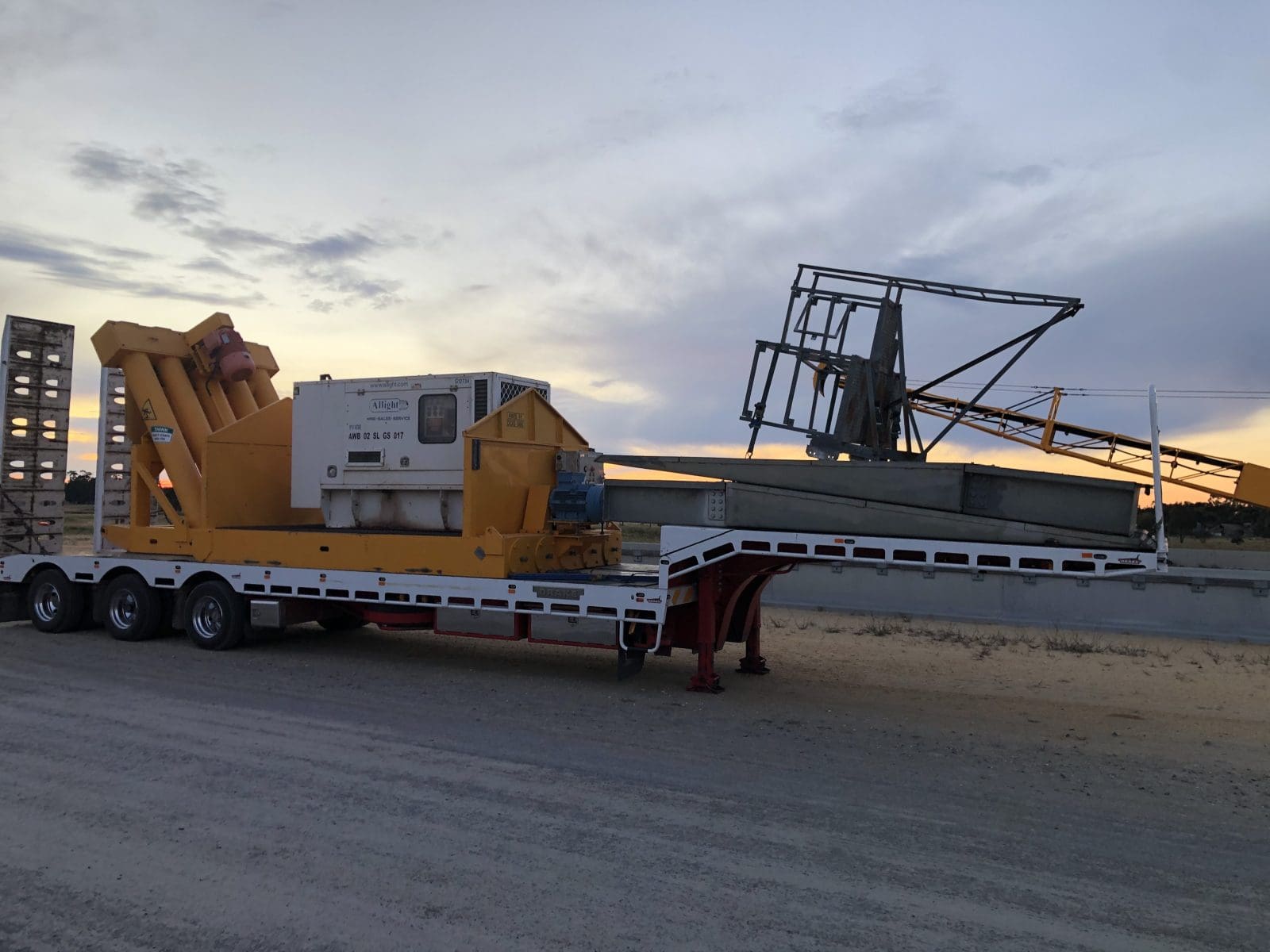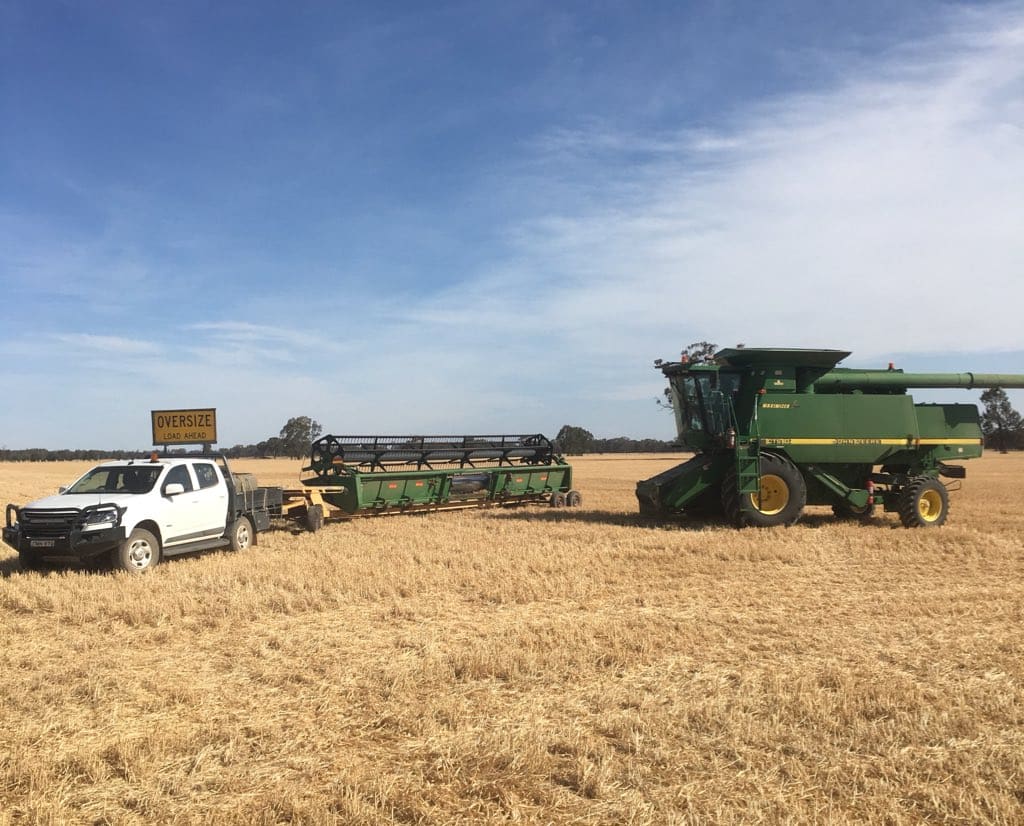
Grain-handling equipment trucked by GrainFlow from Nyngan in NSW site to Charlton in Victoria is ready for unloading. Photo: GrainFlow
THE DISAPPOINTING New South Wales grain harvest is coming to an early and abrupt end, and the grain trade’s focus is now fixed firmly on Victoria’s Wimmera and southern Mallee, and eastern South Australia.
Bulk-handlers like GrainFlow have increased staff and equipment in preparation for the influx of grain from high-yielding crops which is hitting the bunkers as of this week.
In a recent statement on its News Hub site, GrainFlow said extra equipment had been trucked into GrainFlow sites in Victoria and South Australia for this year’s harvest.
“Some of the equipment has travelled thousands of kilometres, having been relocated from storage sites in northern NSW and Queensland, where the drought has bitten hard,” Cargill head of grain operations in Australia and the Pacific Chris Liston said.
DOGs on the move
The equipment includes a number of drive-over grid hoppers (DOGS), which are used to build bunkers.
“The transport of the DOGs is no mean feat, and about 20 crane lifts have been required to position the DOGs in their new home.”
GrainFlow has deployed additional equipment at sites including Birchip, Charlton, Dimboola and Sea Lake in Victoria, and Crystal Brook and Mallala in South Australia.
“The new equipment will provide benefits to growers by enabling us to receive additional segregations, turn around trucks faster and with more unloading points.”
The equipment will support GrainFlow operations during harvest, which is expected to be substantial in South Australia and Victoria in particular.
Early halt in NSW
At Wagga Wagga, Murrumbidgee Grain Services operates a bulk-handling site which receives grain from the eastern Riverina. Director Peter Hassall said the region’s harvest was into its dying days, many crops were cut for hay to supply the fodder market, and yields had been low yields.
“If we’re not finished by the weekend I’ll be surprised,” Mr Hassall said.
“There’s always a big push to be finished by Christmas, but we’re well short of that this year.”
At Junee, Hanlon Enterprises trader Peter Gerhardy said even with low expectations this year’s harvest managed to disappointed most growers on yield.
“They expected a crop that might be down around half what they would get in a good year, and yields are down about 20pc on what they expected,” Mr Gerhardy said.
Hanlon Enterprises services growers in the wider Coolamon, Junee, Marrar and Temora districts, and has seen an early end to harvest.
“Normally canola would be in full flight now, and we’d be moving on to barley and wheat, but it’s all over, red rover, on just about everything now.
“It all comes down to Mother Nature and the lack of rain.”
Mr Gerhardy said any crops that struggled from day one produced better-quality grain than those that showed signs of yielding well and were fed accordingly.
“Those big heavy crops that were fed with fertiliser on the pre-empt of rain and had the potential to yield 4-5t/ha, they were the ones that fell over.”
Screenings in barley particularly have been a problem, but the stockfeed market is absorbing any tonnage being offered.
“In Victoria, 65-75 per cent of grain is being warehoused, or the grower is selling F1 barley on-farm for say $265-$270/t, when the cash blackboards at the depots are showing more like $245/t.
“That means growers are selling plenty of grain direct.”
Questions for canola
In the past decade or two, canola has cemented itself as the main broadleaf crop in the winter rotation for growers in southern and central NSW.
However, some growers are questioning its suitability as a cash crop following two or three seasons of poor performance due to inadequate moisture, and looking at it through new eyes as a source of early hay.
“The rule of thumb is that the canola price should be twice the price of wheat,” Mr Gerhardy said.
“It’s nowhere near that, but now that growers have figured out they can get a hay crop out of it, and sell it for as much as $350-$400/t, there’s good money in it.”
At Forbes, iMag agronomist Cameron Corke said some growers in the wider Forbes, Dubbo and West Wyalong districts had cut canola for hay for the past three years because of frost damage, drought or both.
“We’ve been questioning it for quite a while.
“I still believe it’s a good rotational crop, and people have it in their early plans, but it just won’t yield properly in the hard years if it doesn’t have the soil-moisture profile.
“What it can do is make money, or be used on the farm, if good crops are cut early for hay.”
Mr Corke said the region’s winter-crop harvest was running about two weeks early, and barley was probably its best performer, yielding ahead of harvested wheat crops which produced as little as 700-1000 kilograms per hectare.
Grower experience
North-west of Albury at Walbundrie, Tim Coyle grew barley as a cash crop, winter wheat for sheep to graze and canola.
“We normally harvest for a month, but it only took us two weeks this year,” Mr Coyle said.

The end of harvest 2019 at Walbundrie in southern NSW. Photo: Tim Coyle
The Coyles cut some canola for hay to feed their sheep, and to sell for cash.
“The bulkier paddocks run out of moisture earlier, and the gross margin for selling canola for hay was well ahead of what I left for seed harvest.”
However, cutting crops for hay has its drawbacks in terms of paddock protection.
“Last year I cut canola for hay, and it leaves your paddocks barer over summer, to the rain doesn’t recharge your soil as well as it does if there’s thicker stubble.”
The Walbundrie district has received about half its normal year-to-date rainfall, and little of note since July.
My Coyle said it meant grazing wheats did not bounce back once sheep were taken out of the paddock, and barley was by far his best grain crop, yielding 2.3-3.5t/ha.
Grain Central: Get our free daily cropping news straight to your inbox – Click here



HAVE YOUR SAY